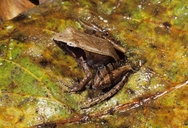|
Description
M 23-27 mm, F 28-31 mm. Tibiotarsal articulation reaches snout tip or beyond. Fifth toe of similar length as third toe. Femoral glands in males distinct and prominent. Frenal stripe completely absent. Ventrally with a blackish throat with a thin median white line (Glaw and Vences 2007).
Variation: Specimens from south-eastern Madagascar show a less distinct dorsal pattern, less dark-coloured lateral head, and a strong genetic differentiation (Glaw and Vences 2007).
Distribution and Habitat
Country distribution from AmphibiaWeb's database: Madagascar
Species occurs in An’Ala, Marovitsika, Midongy, Moramanga, Ranomafana (Imaloka, Mangevo, Ranomena), Tolongoina, Vondrozo (Glaw and Vences 2007).
It has been recorded from east-central and southeastern Madagascar, at 600-1100 m asl (Andreone and Vences 2008). Life History, Abundance, Activity, and Special Behaviors
Habits: Found along relatively slow-moving rainforest streams at rather low elevations. Specimens are found during the day on the forest floor and can be locally rather common but were never heard calling (Glaw and Vences 2007).
Trends and Threats
Listed as least concern in view of its relatively wide distribution, presumed large population, and because it is unlikely to be declining fast enough to qualify for listing in a more threatened category. Though it occurs in many protected areas, its forest habitat is receding due to subsistence agriculture, timber extraction, charcoal manufacture, and invasive spread of eucalyptus, livestock grazing and expanding human settlements (Andreone and Vences 2008). Possible reasons for amphibian decline General habitat alteration and loss
Habitat modification from deforestation, or logging related activities
Intensified agriculture or grazing
Urbanization
Subtle changes to necessary specialized habitat
Comments
Taken with permission from Glaw and Vences (2007) and Andreone and Vences (2008).
References
Andreone, F. and Vences, M. (2008). Mantidactylus aerumnalis. In: IUCN 2008. 2008 IUCN Red List of Threatened Species. www.iucnredlist.org. Downloaded on 07 April 2009.
Glaw, F., and Vences, M. (2007). Field Guide to the Amphibians and Reptiles of Madagascar. Third Edition. Vences and Glaw Verlag, Köln.
Originally submitted by: Frank Glaw and Miguel Vences (first posted 2003-02-21)
Edited by: Catherine Aguilar (2009-05-01)Species Account Citation: AmphibiaWeb 2009 Mantidactylus aerumnalis <https://amphibiaweb.org/species/4572> University of California, Berkeley, CA, USA. Accessed Jun 9, 2025.
Feedback or comments about this page.
Citation: AmphibiaWeb. 2025. <https://amphibiaweb.org> University of California, Berkeley, CA, USA. Accessed 9 Jun 2025.
AmphibiaWeb's policy on data use.
|
